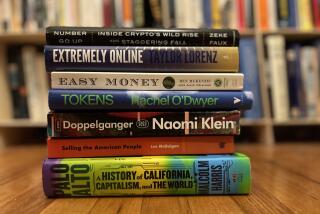The Internet Meets Its Match
- Share via
The early Internet was like a hallucination made real for the beat generation: Aging flower children around the world seized on cyberspace as a kind of virtual global commune -- a world without laws or borders or governments, where man could live free and by his own rules.
Now, all those heady notions of the early Internet era are going the way of the retiring baby boomers and receding into myth. In the end, the Internet did not liberate us from law and capital and taxes. Life online has turned out to be much like life anywhere else: subject to the whims of courts and the laws of nations and very much grounded in geography.
Jack Goldsmith and Tim Wu, two of America’s leading scholars of cyberspace, have written an engaging, fluent first draft of Internet history, “Who Controls the Internet? Illusions of a Borderless World,” which chronicles the failure of this early vision. Provocatively, it also argues that we are all better off without it.
Beautifully written and intricately argued, the book is likely to become a classic of Internet politics and policy. Its central premise is that the pioneer theorists of cyberspace were wrong about what could be done there. They thought the Internet would transform the way we live and love and govern ourselves -- but they were right, marginally, only about the first two. Technology may have altered the way that we interact in an interconnected world, but not the way we are ruled and the institutions that rule us.
It all started in the last decade of the last century, when the conventional wisdom was that globalization, fueled by the Internet, would bring democracy to peoples around the world and defeat all the tyrants. The theory was that like-minded people could come together in cyberspace to govern themselves without the help or hindrance of national governments. The existence of such communities would fatally undermine the power of traditional territorial authorities.
If anything, the Internet has proved the opposite. Goldsmith and Wu -- both law professors; Goldsmith at Harvard, Wu at Columbia -- say the story of the Net so far demonstrates not the existence of a new world order, but the persistence of the old.
Governments still govern what their citizens do and what is done to them, even when the actions originate in cyberspace. Through the force of law and commercial reality, France forced Yahoo Inc. to stop displaying Nazi trinkets for sale where French people could see them, and China forced Google Inc. to censor the search results it displays to Chinese citizens.
Things were not supposed to happen that way. Free speech on the Web was supposed to be unassailable.
But territorial governments that had endured for hundreds or thousands of years were not giving up so easily. They used the ancient tools of physical and commercial coercion to get their way.
At the end of the day, as Goldsmith and Wu point out, the Internet is nothing but a bundle of wires and cables, and regulating physical infrastructure is something that governments do well. They can put pressure on Internet service providers or the financial intermediaries who fund commerce on the Web, or they can threaten to confiscate the local assets of multinationals. They make sure that their laws are obeyed in cyberspace in the same ways as they always have.
Even China -- the kind of regime that ought to have been doomed by the Internet, if the early utopians were right -- has proved amply capable of controlling cyberspace within its borders. Now that China is second only to the U.S. in numbers of Internet users, its critical mass means it can create what amounts to its own Internet.
“We in the West are used to an Internet that is free,” say the authors before pointing out that this is just an accident of its birth in the U.S. Other nations can choose other, much more restrictive, models.
The real question, they say, is not how the Internet will affect China, but how China will affect the Internet. They predict a new Cold War over the widely differing visions of the Internet’s future. from America’s free and so far largely unregulated model to China’s controlling vision.
That, they say, is “the other side of globalization”: the fact that different nations, and different peoples, may want a different kind of Internet, one whose language, content and norms conform more closely to their own.
That might mean the end of the Internet as we knew it circa 1990. But it is, on the whole, a good thing. “Decentralized rule by nation-states reflects what most people want,” they say -- even in cyberspace.
*
Taming the Net
* “Who Controls the Internet? Illusions of a Borderless World”
* By Jack Goldsmith and Tim Wu
* Oxford University Press, $28, 240 pages
Source: Publisher
*
Patti Waldmeir writes on legal affairs for the Financial Times, where this review first appeared.
More to Read
Sign up for our Book Club newsletter
Get the latest news, events and more from the Los Angeles Times Book Club, and help us get L.A. reading and talking.
You may occasionally receive promotional content from the Los Angeles Times.










